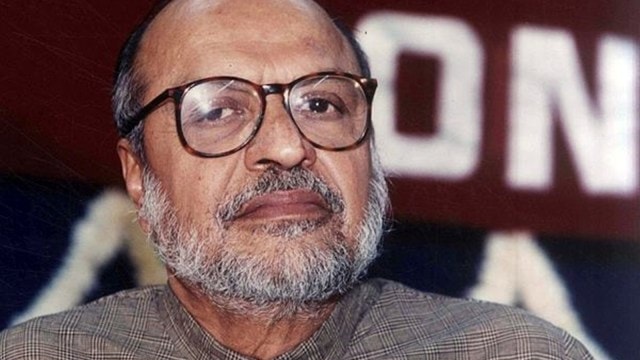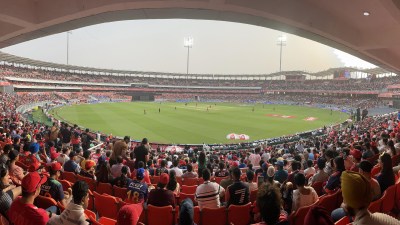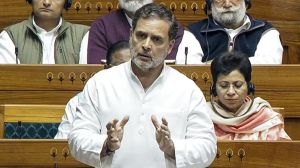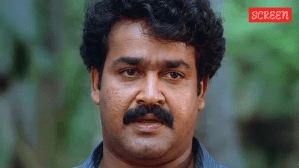Click here to follow Screen Digital on YouTube and stay updated with the latest from the world of cinema.
Shyam Benegal says he faces challenges in getting funding to make movies: ‘I don’t take subjects that 90% of the films have today’
Shyam Benegal's latest film Mujib: The Making of a Nation has released in India today. The film is a biopic of Sheikh Mujibur Rahman, the Father of Bangladesh.
 Shyam Benegal's latest directorial is Mujib: The Making of a Nation.(Photo: Express Archive)
Shyam Benegal's latest directorial is Mujib: The Making of a Nation.(Photo: Express Archive) At 88, Shyam Benegal is one of the most enthusiastic filmmakers to interact with. On the sidelines of a screening of his latest film Mujib: The Making of a Nation, the veteran filmmaker discussed how he has managed to stay relevant in the ever-evolving film industry, his journey that is over five decades, and how he now faces challenges in making more films as he doesn’t get funding.
The first question that comes to one’s mind on meeting the veteran is why he has stayed away from making films for so long even after being one of the most revered filmmakers of the country. And he simply says it’s because “I don’t take subjects that 90% of the films have today.”
Shyam Benegal has not directed a film in over a decade. His last film was Well Done Abba (2010), a political satire starring Boman Irani and Minissha Lamba.
Now, at 88, Benegal has returned to the director’s chair to helm the India-Bangladesh joint production Mujib: The Making of a Nation. The film has released in India today. When asked now that he’s back to filmmaking, what would be his next film, the filmmaker said, “You tell me what should be my next film! I don’t know. I was making a film on Syama Prasad Mukherjee, that was a long time ago, but the fact is that it never went through. It needed to be funded properly. I don’t want to walk into a film which is not fully financed.”
When asked if he really faces issues finding funding for his movies even after his glorious filmography, he said, “Of course, because I don’t take subjects that 90% of the films have today.”
One also wonders how Shyam Benegal, who’s stayed away from the limelight for long, has been keeping in touch with the changing trends in the film industry and what are the kind of films he watches today. The veteran director said, “I watch a lot of films, those that come on television. The last film I watched was Kathal. There are many more, but this one was good.”
Benegal then spoke about why he decided to make a film on Sheikh Mujibur Rahman, the Father of Bangladesh.
“There one very interesting thing that struck me is how he combined his political life and his family life. Because by and large, people of political eminence and responsibility usually have to compromise on one part of their life. Choose one above the other. And for many of them, for so many great people, it is terrible what happens to their personal lives. But, in the case of Sheikh Mujib, it was not like that. He balanced his private life and his political life perfectly. He had a very happy family life, and he had a very strong support within his party when he came to power and fought for Bangladesh.
“It is like Macbeth. He is almost like Macbeth because people who he trusted, he trusted them fully. When you are in politics, you cannot do that. You cannot be blind to their faults because you have far too much responsibility. His life is almost like a Shakespearean tragedy and this struck me. This was the important thing that I had to bring out in the film,” he said.
Shyam Benegal’s film is a biopic on politician Sheikh Mujibur Rahman, and the filmmaker says it is not easy to make films on such personalities, including the Indian Prime Minister Narendra Modi because one has to navigate through an overload of information to find something about them that “suddenly reveals the man”.
He said, “It is not easy to make such a film because you can end up doing very conventional things. It is very difficult to say anything from another point of view because there are so many points of views that are already covered by so many people — historians, the press. They are people in the news all the time so there’s a lot written about them. In that whole jungle of information, you have to find your way and find that one thing that suddenly reveals the man. We have our prime minister. How many of us know him? I don’t know. But we think we know him because there is a public image of him and he is written about every day. You see him doing various things. You see him meeting different personalities in different countries, but how many of us know him as a person. It happens to public figures. It is like peeling an onion.”
Mujib: The Making of a Nation also deals with India and Bangladesh’s relationship with Pakistan. So how did Shyam Benegal deal with the political sentiments of the three countries involved? He said, “I have been as true as possible to the topic.”
“You have to be as true as possible to what happened at that time. On every level, otherwise you will be guilty of a lot of things because it is not my story being told. It is not something that I have invented through my mind. It is history.”
Is it then difficult to make biopics on political figures? To which Benegal recommends caution because it means one is dealing with history.
He said, “At best of times, it is difficult because you are dealing with history that too contemporary history. You are not even dealing with history three hundred years ago where nobody today would know what happened then. Here everybody knows, the whole country knows what had happened. When you make a film, you have to find means and ways to see that the negative comments have to be reduced to a minimum.”
- 01
- 02
- 03
- 04
- 05


































